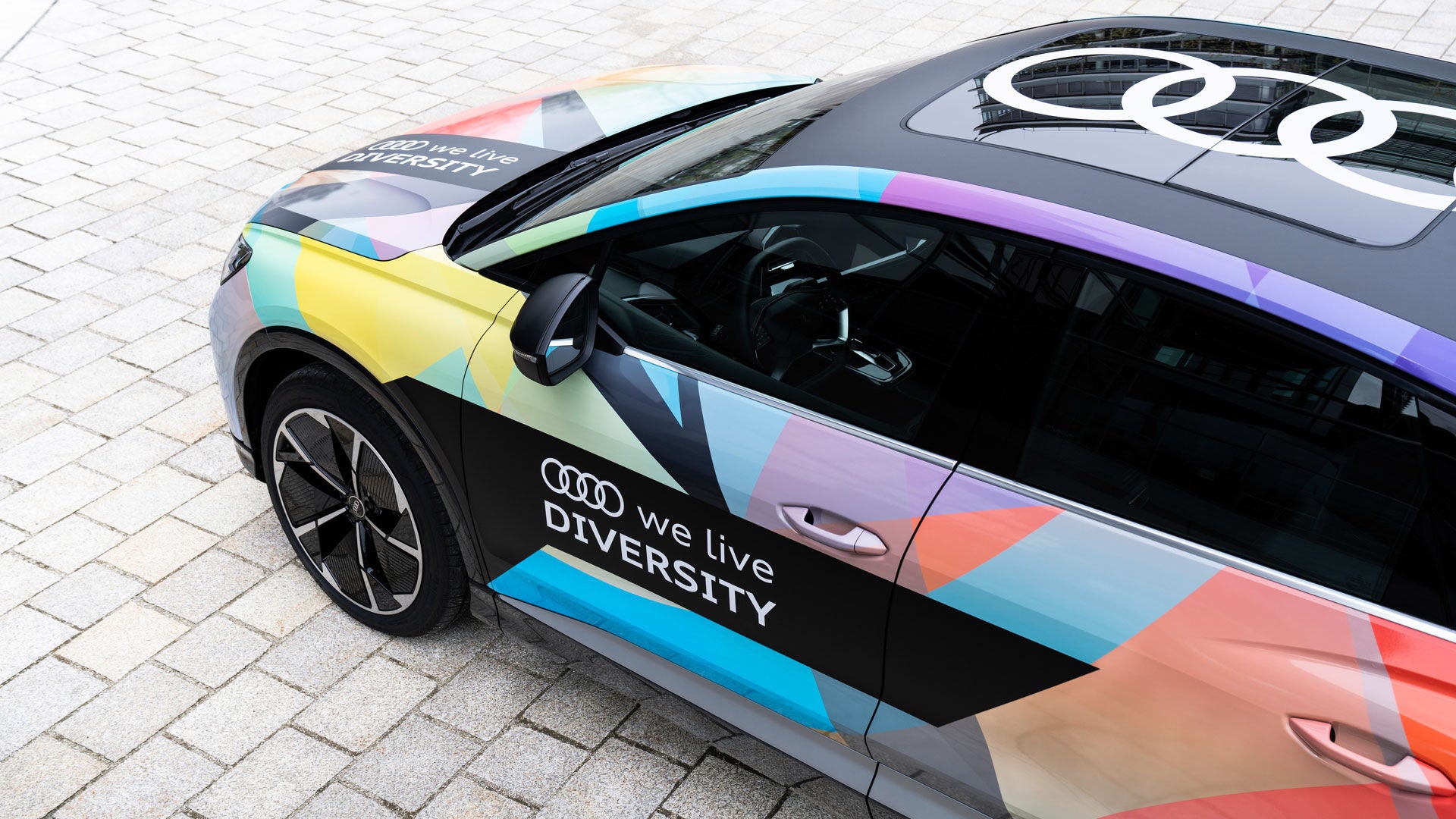A concept for greater sustainability in the supply chain
missing translation: fa.article-intro.reading-time – 06/17/2025

Audi is extending its efforts to promote diversity in communities that go beyond the company by integrating diverse partner companies in its supply chain. These are companies that either create social added value by solving societal or ecological challenges (social businesses) or are owned by people from marginalized groups (minority-owned businesses).
This approach offers an enormous potential for change. As a Group that operates worldwide, Audi works with more than 12,400 supplier partners from more than 60 countries. Together, this network can set a lot in motion. By integrating the value of diversity throughout these supplier networks, Audi's impact is multiplied throughout the various vulnerable, minority, or marginalized communities that these suppliers serve. Diversity promotes equitable participation in professional life and releases a greater potential for innovation. Innovations are a key to entrepreneurial success.
For its Procurement with Purpose initiative, Audi is working with Berlin-based leading social innovator, Yunus Social Business, which aims to strengthen the company's supply chain through a more conscious and values-based selection of diverse supplier companies. By giving social businesses and minority-owned businesses (MOBs) the chance to integrate into Audi’s supply chain, diversity is promoted through Audi’s business operations and added social value is delivered to greater society.
Social businesses – enormous market potential
bn US$
bn US$
(Study by BCG and Yunus SB)
Lucie Durand, co-CEO of Yunus Social Business says: “Sustainability starts with seeing how every purchase shapes society. Broadening the supplier mix with impact driven or diverse businesses make corporate supply chains nimbler and more resilient, while also strengthening brand reputation and community goodwill”. Working together with diverse companies has long since evolved from a nice-to-have to a relevant business factor.
Why groups work with social businesses:
%
Alignment with corporate values, purpose, culture & goals
%
Answer to increasing customer demand for socially sourced products and services
%
Innovation driver through developing new business & sales models in collaboration with social businesses
(Study by YSB, Porticus, WEF'S Covid Response Alliance for Social Entrepreneurs.)
What is Audi doing to promote diversity and sustainability?
Audi believes that diversity and sustainability are key prerequisites for a successful future. This is why Audi implemented holistic diversity management back in 2017. With campaigns such as the Procurement with Purpose initiative, the company is working on pursuing the goal of promoting equitable participation in the supply chain as well.
Michael Faust, Head of Supply Chain Sustainability at AUDI AG, clarifies: “For years now, our team has been working on ensuring that sustainability is one of the decisive nomination criteria when selecting a partner company, alongside quality, technological competency, logistics and price. A minimum level of sustainability performance is therefore mandatory for us.”
Are diverse companies ready for working together with major groups?
Reliable supply chains and procedures are essential for the automotive industry in particular. However, working with diverse companies requires making adjustments to company processes to ensure that the cooperation runs optimally.
Where can we find suitable partner companies? What distinguishes them? Where do we need to adjust to the needs of social businesses, for example? What needs to be considered in connection with the implementation? During the initial phase in particular, cooperation with social businesses and MOBs requires great commitment at all Audi Group levels, as well as to our partners.
Both parties, corporations and diverse suppliers, must adjust to one another. The experience of Yunus Social Business has shown, for example, that the bureaucracy involved in procurement at large companies or the quantities needed are challenging for diverse companies. However, the companies can accommodate them here.
“Social enterprises can be reliable suppliers, and it is an opportunity for procurement teams to explore how to integrate social impact into their process and procurement strategy," says Lucie Durand, co-CEO of YSB. The benefits are obvious to her: “Companies that buy from impact-led enterprises and diverse businesses not only get the materials, products, and services that they need anyway. They also embed measurable social value into their procurement process, advancing sustainability targets and creating innovative business partnerships, all in one move”.
For those who commission these social businesses, specific training, research, and securing the buy-in of the stakeholders involved, from the management level to the purchasers, are extremely important. Establishing supplier diversity is a long-term endeavor but, when done properly, can also offer long-term advantages.
With Yunus Social Business (YSB), Audi has an experienced partner by its side. Audi makes use of this expertise when it comes to searching for new partners, reviewing processes, and training our employees and partners. These days, a lack of knowledge is often one of the greatest obstacles.
In the course of the Act4Impact program, we are raising the employees’ awareness of the topic, training and qualifying them. Audi is using established and new ways of transferring knowledge such as workshops, webinars, and certification programs.
5 factors for successful cooperation with social businesses:
Yunus Social Business: A strong partner on our path toward a more diverse supply chain
Audi can already look back on a successful pilot project: Social business “Community Kitchen” was the first company to be commissioned in the context of the Unusual Partners program of YSB. The company rescues food that is still edible but would otherwise be thrown out and uses it to cook creative meals.
Community Kitchen also offers environmental education for school classes and enables volunteers to participate in a community in the form of a hands-on kitchen. We were convinced by this innovative business model and the social and ecological added value that is created and hired the social business as a caterer for the first Creators’ Day, a format for content creators and influencers, at Audi. The success of this pilot showed us that it is worth pursuing this cooperation.

Partnerships with diverse companies are a stabilizing success factor for the supply chain
Audi is forging new paths toward sensible and effective business partnerships. The aim is to achieve positive changes for as many people as possible. To do this, the company is making use of its global network.
Audi is aware that purchasing activities affect the environment and society. The company is working on making this effect as positive as possible. Initiatives such as these help to build important bridges to connect with global social businesses and MOBs and thereby generate added value for the supply chain and the communities around them.


